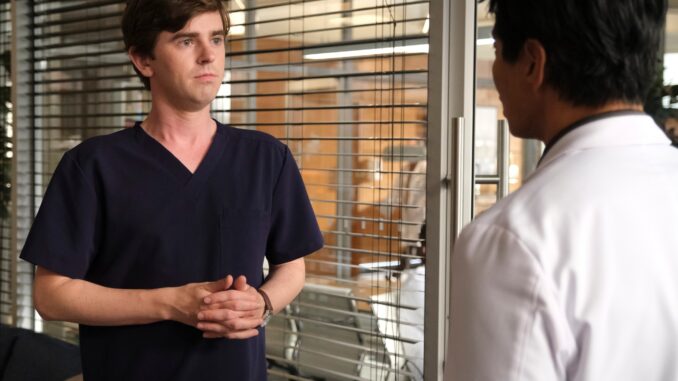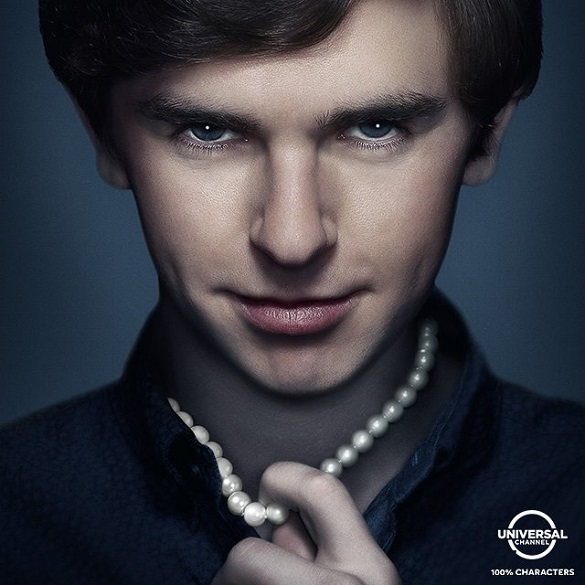
It’s almost time to check-in again with the good people of the not-so-sleepy suburb of White Pine Bay, as Bates Motel returns for season four. With Freddie Highmore as Norman Bates starring alongside Vera Farmiga, Olivia Cooke and Max Thieriot it comes as no surprise that the show has proven to be popular.
So far we’ve seen enough moments of sheer creepiness that will not fail to make you shudder as momentum gathers for what lies ahead. We got the chance to catch up with everyone’s favourite psycho, Freddie Highmore, to talk about the new season, bizarre fan experiences and the evolution of TV. And we thankfully didn’t make him angry…
Bates Motel returns to the UK on April 5th, so what can you tell us about it?
It’s the most intimate we ever get to see Norman and Norma and there’s an inevitability of their relationship, an inevitability that they have to be together and an inevitability their romance ultimately being the biggest romance on the show. No matter what they will always have to be together. Today is actually the last day of the eighth episode so I am guessing anything I can tease at this point will seem slightly out of context.
That’s the episode you wrote, isn’t it?
Yes. I feel very lucky that I was allowed to be part of the writing team this season. I went out and spent some time with them out in the writers’ room in L.A. I then ended up writing the eighth episode so feel very lucky. I just need to make sure everybody says all the words! [laughs]
What was that whole experience like in the writers’ room in L.A?
It was very collaborative and that’s testament to how Kerry runs the room. It was my first ever experience of being in a writers’ room. But from what I hear and from what I guessed, there can be certain rooms where that sharing of ideas can be competitive. People take ownership and feel very strong on certain ideas over others.
Everyone was incredibly welcoming and they wanted to hear my ideas. It was never the sense that one person idea was better than others. It was very much this collaborative effort where by the end you’re not sure whose idea was what. It’s just sort of a perfect team environment.
I suppose the natural progression would be maybe to direct an episode, is that something you’d be interested in doing?
Yes, I would love to do that. Hopefully next season that’s something I’d be able to do.

How does this season compare to previous ones and is it certain there will be a season five?
We now know we’re doing five seasons of the show and that’s sort of official. We’re now sort of racing towards an end point that the writers have established. Which is incredibly exciting and there’s no holding back now. I always sort of say that every season is the best but it really is the case on this one.
It’s the most intimate we ever get to see Norman and Norma and there’s an inevitability of their relationship, an inevitability that they have to be together and an inevitability their romance ultimately being the biggest romance on the show.
No matter what they will always have to be together. That pits Norman against Sheriff Romero this season and their rivalry develops. I guess from Norman’s perspective there’s this slightly analytical look that we haven’t done before, a deeper look at his psyche and what’s really going on under all of that and if he can be saved.
There’s certainly an attempt from Norman this season to try and get better. But of course he’s Norman Bates so there are people he’s going to kill this season but there’s always this side of him of always trying to do the right thing and doing what he thinks is best.
So last season we see some major psychological changes in Norman with the kitchen scene in Norma’s robe. Will we be seeing more moments like this at all in the new season?
Yes, there’s more of that. That’s the dark humour that I was speaking about, it’s sort of laugh out loud and there’s a creepiness to it. In the first episode of this season we see Norman assume that role of Norma again, get on her clothes and there’s this sense he has become her. Who knows what he will do once he has…
How was it for you to develop the “Mother” character?

This season in particular there was this exciting development of building more and more the version of Norma that Norman becomes when he thinks he is his mother. There are times where we see both Vera and I play that character in the one scene. Similarly to what happened at the end of the third season with Vera as Norman bash out Bradley’s brains on the rocks.
So there were great scenes this year where both Vera and I would watch each other do alternate takes. One take after another and you would use ideas the person had done and incorporate it into your own scene. It was this very collaborative way of creating this one character together and that was something I had never done before.
What’s been the most difficult day on set have you had to date?
Perhaps the trickiness in playing sort of Norman playing Norma,I would say. Of course there’s an attempt to mimic Norma’s mannerisms and that’s everything Vera has put into creating that amazing character and she’s done that so wonderfully. I feel at the same time from Norman’s perspective it should never feel studied or performative.

At that moment he feels he is her instead of trying to pretend to be her. It’s a matter of what I felt of not doing too much so that it feels like it’s fake or that it would be pushing the boundaries of what would really happen. Although there’s a certain physical embodiment of her, it’s more of a mental shift for Norman as opposed to a physical one.
With the medium of TV becoming increasingly more cinematic and attracting massive names, is there such a thing as a TV actor anymore?
I am not sure. Vera and I is both of our first TV shows and so I think there’s much more of a crossover and the stories you are allowed to tell are so rich and intimate and get on to a deeper level of someone’s character than you could ever attempt to do in a two hour film.
I think that’s what attracts people to it. Just sort of imagining our show and trying to tell that sort of the development of a serial killer and everything that contributes to that, it would seem pretty impossible to force all of that into a film. The story-telling capabilities of TV are phenomenal.
You also worked with Kerry Ehrin on a sitcom script for NBC. Has it been picked up and what can you tell us about it?
No. There are a number of variables and I still don’t fully understand the pilot process in America. There are various stages and we didn’t get through to the last one. We certainly had fun writing it and I am very grateful to Kerry for taking me under her wing in both in Bates and that. I’d like to do more writing in the future.

